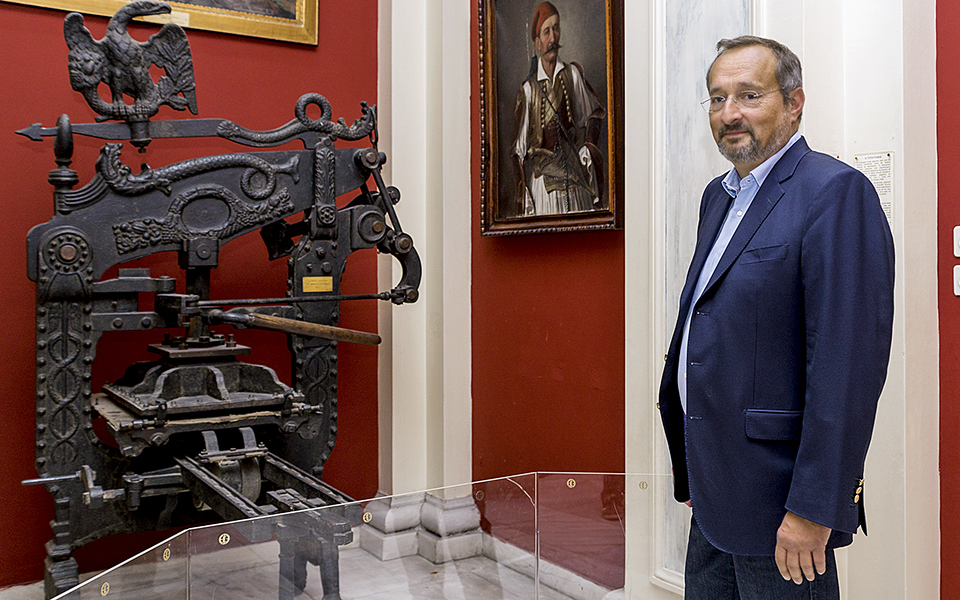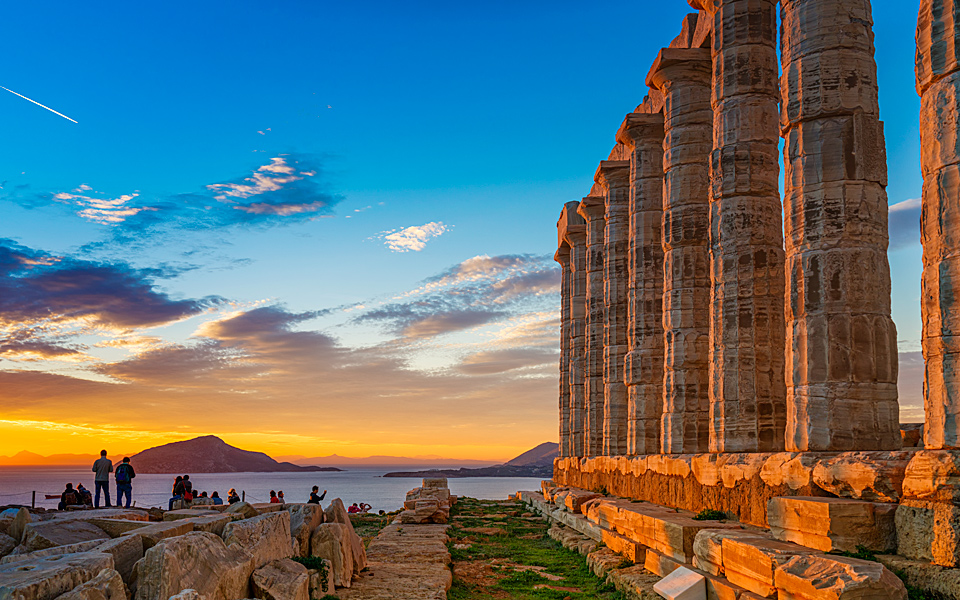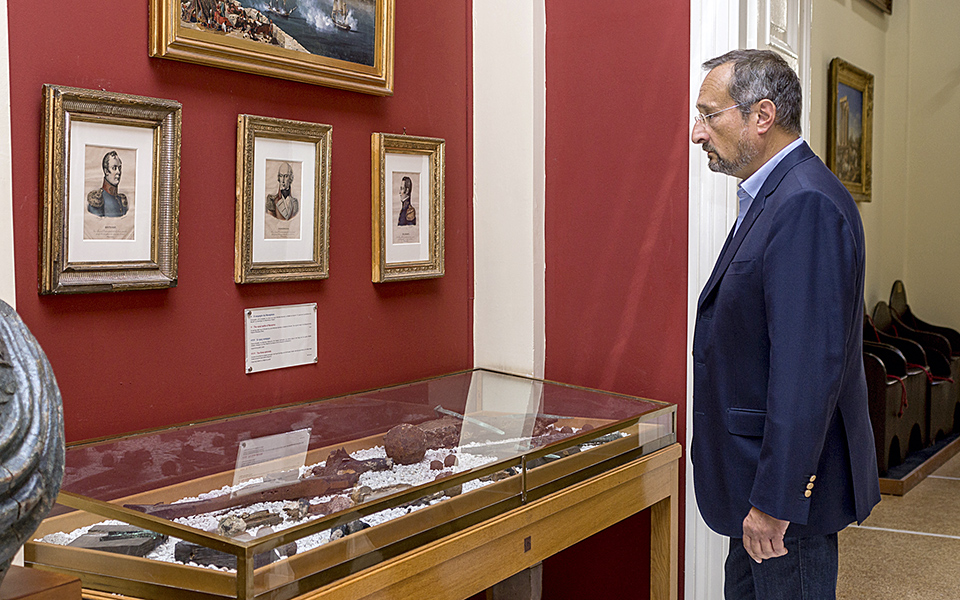Abra Ovata: A Lakefront Restaurant Redefining Greek Hospitality
Abra Ovata is itself a rare...

Cristophe Chantepy, the French Ambassador to Greece.
© Alexandros Antoniadis
When he was a student in high school, his Ancient Greek teacher often spoke passionately about her trip to Greece back in the 1960s and shared her love for the country.
“She told us about the olive trees undulating like the sea beneath Delphi, about the majesty of the Parthenon, about the perfect ‘marriage’ between land and sea,” he remarked when assuming his post in Athens in 2015. “Mainly, she spoke of the Greeks’ hospitality, of the coffee they offered her together with a glass of cold water in the villages, of the Greek spirit.”
He witnessed all these things for himself when he made his first trip here, and today, as French ambassador to Greece, Christophe Chantepy shares his memories of that time as well as his experience of Athens:
“My first trip to Greece was in the summer of 1981 with a group of friends and fellow students – we were six men and one woman. I was 21 years old. We traveled to Corfu and camped out on a small beach, Myrtiotissa. I know today it’s much smaller – it was swallowed by the sea when the water level rose.
I remember how impressed I was by the Mediterranean landscape, of which I had heard so much: the cicadas and their endless song, the olive trees, the pines, and the sea. A week later, we took the ferry to Patra, visited Olympia and Delphi, and then ended up in Athens – all this by bus, of course.”
“Athens has a diversity that I find particularly attractive”

Syntagma and Lycabettus Hill, 1865. Photo by Demetrios Konstantinou.
I spent three days in Athens on that first trip and each day held amazing discoveries: the Acropolis and the Parthenon, the National Archaeological Museum, Plaka, Hadrian’s Arch, the Kallimarmaro [Panathenaic] Stadium.
I came back the following year and for several years after that returned to Greece for my holidays, but not to the capital. I wanted to explore the islands. I had been left with the impression that what was interesting in Athens was related to antiquity – its museums, monuments and archaeological sites – rather than the city itself.
Like most French people, I had no idea it was so beautiful and interesting in its own right. This dawned on me when I moved here as French ambassador. What is it that makes it so attractive and intriguing? To begin with, all the layers of history – and not only antiquity – that have become imprinted on every little thing, especially the architecture: from the ancient monuments and the neoclassical mansions to the small houses you see in Thiseio and Psyrri, and from the Bauhaus buildings to the apartment blocks of the 1950s and ‘60s. Most European cities, like Paris, are characterized by architectural homogeneity. Athens has a diversity that I find particularly attractive.
After the city’s beauty, I began to discover the beauty of its residents. Their creativity and their innovative spirit impressed me. I can now say with certainty that I know the real Athens. The image I have is not superficial, that of the tourist who passes by before boarding a boat to some island and only sees the basics.
There are a lot of neighborhoods I like a lot. Exarchia, for example, for its vibrancy, its cafés, bars and restaurants. I like Lycabettus, with its uphills and downhills, and Psyrri, for walking around its narrow streets, particularly in the fall or spring, as well as Thiseio and Pangrati.
“Greece is not a country to be left”

The Temple of Poseidon at Sounio.
© © Perikles Merakos
I also love Sounion. The Temple of Poseidon is a magical spot. I suppose you know that it forms an isosceles triangle with the Parthenon and the Temple of Aphaea in Aegina? Isn’t that incredible?
I’ve recently discovered some lovely places in northeastern Attica as well, like Artemida. Beyond the Acropolis and the other important archaeological sites, I would like to mention a few newer buildings that I find perfect in terms of architecture and very moving because of their history. Such as the Old Parliament, Greece’s first parliament (from 1875 to 1935), on Stadiou Street, which is now home to the Museum of National History, a treasure trove of Greece’s modern history. I stop to admire it every time I pass by. It’s not just its beauty that draws me, but its fragility as well. It reminds me of the beauty and fragility of democracy itself.
Greek cuisine is not very well known abroad. Of course, foreigners know about souvlaki, moussaka and Greek salad, but it’s a pity that this is all they know because there is such an incredible wealth of flavors and products in Greece. I love stuffed vine leaves with egg-lemon sauce, the spetzofai sausage dish and the snails they prepare on Crete – in the frying pan with vinegar and rosemary – called chochloi bourbouristoi. When friends from France visit, I always recommend they try them.
Eating in Greece means generosity and the joy of sharing: lots of small meze and friends trying a little bit of everything and enjoying not just the food but conversation as well. And, of course, I love all the traditional Easter dishes: the magiritsa lamb offal stew, spit-roasted lamb, crispy kokoretsi offal sausage.

Christophe Chantepy in the Museum of National History, housed in the Old Parliament, one of his favorite buildings in Athens.
© Alexandros Antoniadis
When I go out for dinner, I often choose Karavitis, a historic tavern that has been around for nine decades. I also like Oxo Nou, a Cretan meze place in the city center, the French Chez Violette, which shares the building with Ama Lachei with its lovely garden and Rozalia, all of them in Exarchia.
Other places I find very pleasant are Mavro Provato in Pangrati, Nikitas, a tiny taverna in Psyrri and Kafeneio, near the embassy in Kolonaki. I have been learning Greek almost since the first day I moved to Athens and have a grammar and syntax book on my desk. I also learn a lot from reading the crime novels of Yannis Maris, because his vocabulary is not too complicated.
But I always remember a few phrases I learned as a student in Ancient Greek class, like kalos kagathos – a term used to describe a person who is handsome and virtuous, the combination of physical beauty and moral excellence.
When the time comes to leave, what I would like to take as a souvenir is a photograph of Athens from the 19th century: a small scattering of houses, a city that is just starting to grow around the Royal Palace, today’s Parliament Building, and Lycabettus standing tall, alone.
This image to me is the scene of the beginning of modern, independent Greece; with a lot of question marks but also much promise. But I think I will never really leave Greece at the end of my term as ambassador. Because Greece is not a country to be left.”
Abra Ovata is itself a rare...
Recycling is an age-old tradition in...
A natural spa by the Athenian...
Beneath the busy streets of modern...